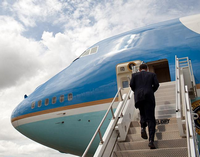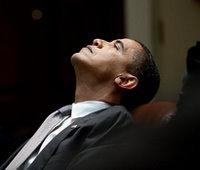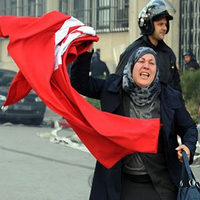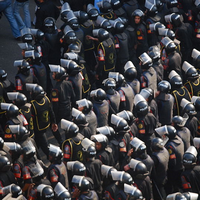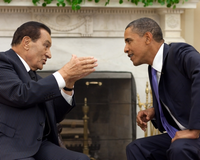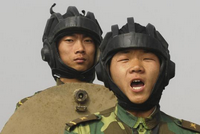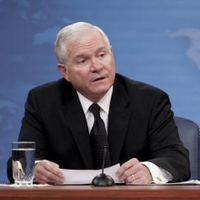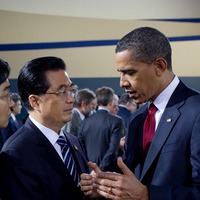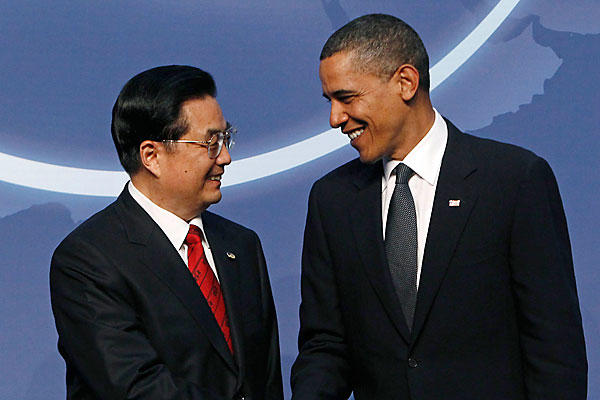Setting up our version of a war room on Egypt.
We should have a basic available-to-anyone summary page up hopefully by Saturday afternoon, with drill-downs saved for subscribers.
Til then:
 After Mubarak, will Egypt face a void?
After Mubarak, will Egypt face a void?
BY TIM LISTER, 29 JAN 2011
QUOTES:
Thomas P. Barnett of forecasting group Wikistrat put it more colorfully: "Let me give you the four scariest words I can't pronounce in Arabic: Egypt after Hosni Mubarak" . . .
In any event, says Barnett -- formerly a professor at the U.S. Navy War College -- events in Egypt and Tunisia show that the "Islamist narrative" to explain the woes of the Arab world is being challenged by a maturing and well-educated youth movement whose expectations of a better life have been dashed by economic stagnation and a stifling political atmosphere . . .
Barnett, chief analyst at Wikistrat, says Mubarak's best -- and perhaps only -- option may now be to announce an "exit date" to take the sting out of the protests, organize an orderly transition to fresh elections and hand authority to a caretaker Cabinet that could focus on growing the economy . . .
Read full piece here.
The New Rules: The Battle for Islam's Soul (Jan 2011)
 Beginning with the Iranian Revolution in 1979, the West has viewed the Middle East and North Africa primarily through the lens of radical fundamentalist political movements. That perspective has narrowed our strategic vision ever since, conflating Shiite with Sunni, evangelicals with fundamentalists, Persians with Arabs, Islamists with autocrats, and so on. But recent events in Tunisia and Algeria remind us that the vast bulk of history's revolutions are fueled by economics, not politics. In this, the struggle for Islam's soul is no different than that of any other civilization in this age of globalization's rapid expansion . . .
Beginning with the Iranian Revolution in 1979, the West has viewed the Middle East and North Africa primarily through the lens of radical fundamentalist political movements. That perspective has narrowed our strategic vision ever since, conflating Shiite with Sunni, evangelicals with fundamentalists, Persians with Arabs, Islamists with autocrats, and so on. But recent events in Tunisia and Algeria remind us that the vast bulk of history's revolutions are fueled by economics, not politics. In this, the struggle for Islam's soul is no different than that of any other civilization in this age of globalization's rapid expansion . . .
Read the whole column at World Politics Review.
Who Should Worry About the Tunisia Fallout, Really? (Jan 2011)

4. Egypt's modern "pharaoh" should worry.
Last time I was in Egypt, I heard the same lament from every young man I came across: "I can't get married because I can't get a job!" You want to brew a revolution? There's no faster way than keeping young men from getting their just desserts, if you know what I mean. Put them off long enough, and some will resort to a strap-on — you know, the kind that allegedly wins you 72 virgins in the afterlife. And president pharoah Hosni Mubarak's latest offer to his public is... 8-percent economic growth for the foreseeable future. Now that's downright China-like, if he can keep his promises — and fast . . .
Read the full post at Esquire's The Politics Blog
 Egyptian strongman Hosni Mubarak's "emergency rule" is deep into its third decade, with modernizing son Gamal teed up as the pharaoh-in-waiting. While Gamal's efforts to open up Egypt's state-heavy economy have progressed nicely the past few years, so has Mubarak the Elder's repression of all political opponents, yielding the Arab world's most ardent impression of the Chinese model of development.
Egyptian strongman Hosni Mubarak's "emergency rule" is deep into its third decade, with modernizing son Gamal teed up as the pharaoh-in-waiting. While Gamal's efforts to open up Egypt's state-heavy economy have progressed nicely the past few years, so has Mubarak the Elder's repression of all political opponents, yielding the Arab world's most ardent impression of the Chinese model of development.
But with the global recession now reaching down deeply into emerging markets, serious cracks emerge in the Mubarak regime's facade. Unemployment is - unofficially - somewhere north of 30 percent. Worse, it's highly concentrated among youth, whose demographic bulge currently generates 800,000 new job seekers every year.
Ask young Egyptian men, as I did repeatedly on a trip, what their biggest worry is, and they'll tell you it's the inability to find a job that earns enough to enable marriage - a terrible sign in a society becoming more religiously conservative.
At 83, Hosni Mubarak is an unhealthy dictator who's achieved a stranglehold on virtually every aspect of Egyptian life, creating an immense undercurrent of popular resentment. While Washington focuses on Iran's reach for nukes and its upcoming presidential election, Egypt is more likely to be plunged into domestic political crisis on President-Elect Barack Obama's watch . . .
Read more: Thomas P.M. Barnett's Globlogization - Scripps Howard News Service column - Four scary words: Egypt after Hosni Mubarak

Egypt: The Country to Watch, Esquire, October 2006
Let me give you the four scariest words I can't pronounce in Arabic: Egypt after Hosni Mubarak.
Osama picked the time (9/11), and Bush picked the venue (Iraq), but this fight between radical Islam and globalization's integrating forces was preordained the day Deng Xiaoping set in motion China's economic rise almost three decades ago. You can't rapidly add billions of new capitalists to the global economy and pretend the Islamic Middle East will remain queerly disconnected forever, somehow fire-walled from that borglike assimilation.
And so, while resistance may be ultimately futile, it will be bloody as hell in the meantime, with Cairo--not Tehran--likely to become the next big flash point in this Long War . . .
Read the entire piece here.
 Monday, March 21, 2011 at 10:00AM
Monday, March 21, 2011 at 10:00AM For decades now, strategic experts have predicted that our world was on the verge of a break-out in nuclear proliferation that would see us grappling with two- or three-dozen nuclear powers. Indeed, the inexorable spread of nuclear weapons is the closest thing to an unassailable canon in the field of international relations, as one cannot possibly employ the term "nuclear proliferation" without preceding it with the modifier "increasing." This unshakeable belief, wholly unsupported by any actual evidence, drives many Cold War-era "wise men" to argue that mutually assured destruction (MAD) and strategic deterrence in general are obsolete and therefore immoral in the post-Cold War era.









